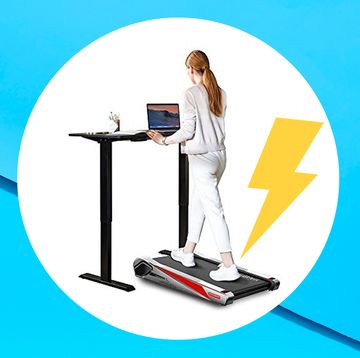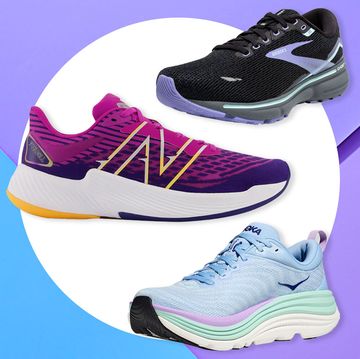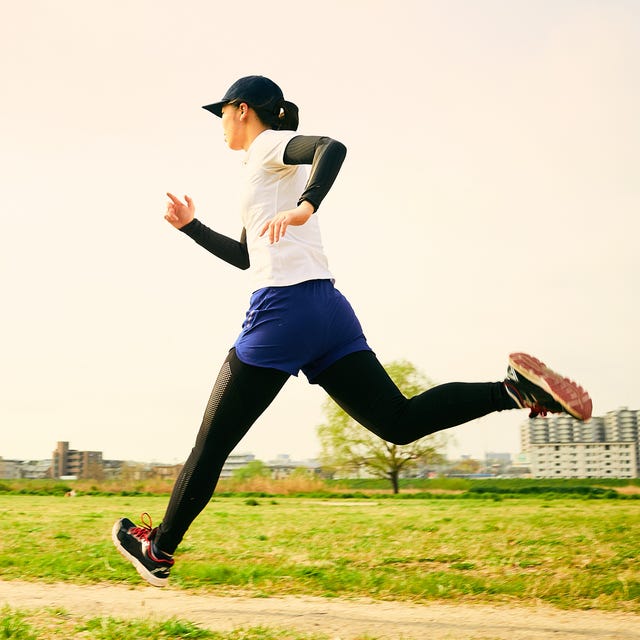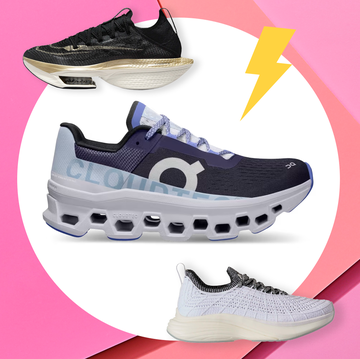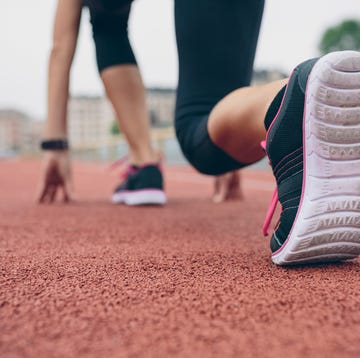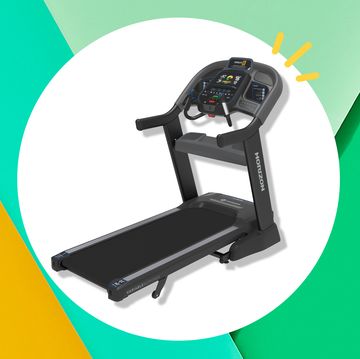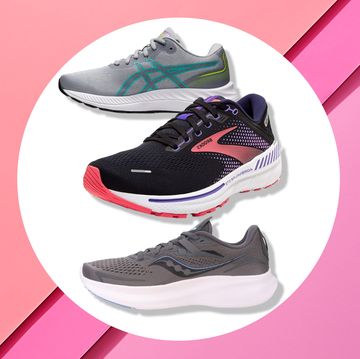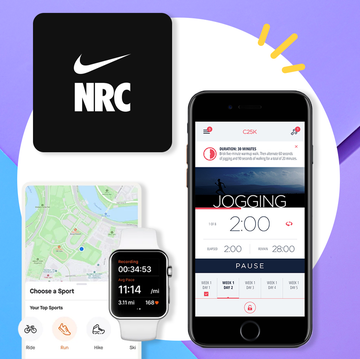1Running slashes your risk of heart disease.
Good news for your ticker: Running could cut your risk of death from cardiovascular disease by 45 percent, according to research published in the Journal of the American College of Cardiology.
How? Running helps improve blood pressure, HDL (good) cholesterol, and blood sugar sensitivity, explains Janet Hamilton, CSCS, an exercise physiologist at Running Strong in Atlanta. All of these factors play a role in cardiovascular health.
2It also burns calories like crazy.
Of course, “the calories you burn running depend on a few variables, including your weight, sex, and age, as well as the weather, terrain, altitude, and effort you put into each step,” says certified running coach Corky Corkum, CPT, Variis Precision Run Instructor. “On average, most people lacing up burn about 100 calories per mile.” Not bad, eh?
3Running strengthens your joints.
Don't let that "running is rough on your joints" mumbo-jumbo fool you. “There is always a lot of commentary around the negative effects of running on knees and joints, but there is actually a lower prevalence of hip and knee arthritis amongst active marathon runners,” says Corkum. (Yep, research published in The Journal of Bone & Joint Surgery backs this up, finding no correlation between running history and arthritis.)
“Instead, the study concluded that hip and knee arthritis is highly dependent on age, family history, and surgical history,” Corkum says.
Advertisement - Continue Reading Below
4It relieves stress.
If yoga isn't your thing, running can work wonders for stress relief. “Running reduces stress because you need to be super present while doing it,” says Sims. “I use running as a form of meditation, in which I really focus on my breath, sometimes even saying a mantra on the inhales and exhales. Running also allows me to separate myself from the other stresses of the day, giving me an opportunity to focus on bettering myself and enjoying a fun playlist.”
Need more convincing? Running actually mitigates the effects of long-term chronic stress on the brain, according to a recent study published in a volume of Neurobiology of Learning and Memory. Better grab those sneaks!
5It keeps your peepers healthy, too.
Your eyes are the window to your health, and, like your heart, affected by conditions like type 2 diabetes, high blood pressure, and obesity. As it helps ward off these chronic issues, running may also lower your risk for developing vision-clouding cataracts, too, says research published in Medicine & Science in Sports & Exercise.
6Running improves your follow-through (in all aspects of life).
If you can power through a run, you can power through anything. Really. Research out of the University of Iowa shows that since cardio exercise requires extended and consistent effort (hello, long, hot runs), doing it regularly can improve your ability to stick through lengthy and arduous to-do's. Big annoying work project coming up? Your running routine has got your back.
Advertisement - Continue Reading Below
7It strengthens your bones big time.
“Most people consider bones as strong and unchanging. However, after age 30, there is significant potential for decreases in bone density,” says Sims. “This sounds scary, but we are in luck! Bones are living things, and therefore get stronger when a force—like running—stimulates growth.”
That's right; High-impact exercise (like running!) spurs bone growth and promotes healthy bone mineral density. It's a must if you want to avoid fractures and stay mobile your whole life long.
8Running may even reduce your risk of cancer.
Regular exercise has long been associated with a lower risk of certain cancers—a link highlighted by a massive Journal of Nutrition review of 170 studies. The National Cancer Institute suggests that high levels of physical activity may decrease your risk of bladder, breast, endometrial, colon, and gastric cancers, in particular.
Regardless of your access to gyms or fitness classes (or how much money you can invest in getting sweaty), running is a surefire way to move your body and protect your long-term health.
9It can get you outside.
If you don't think that the amount of time you spend outdoors impacts your well-being, let's talk about vitamin D. Our primary source of this important vitamin, which helps keep your bones healthy, your mood lifted, and your immune system humming, is the sun—which is why research published in the Journal of Pharmacology and Pharamacotherapeutics suggests that the more time you log outside, the better.
This isn’t to say that running on the treadmill won't do you good, though. “Outdoor and indoor running can truly work together," says Corkum. "The treadmill can be an amazing training tool; it keeps a runner honest in pacing and offers a safe and temperature-controlled space to run.” She encourages new runners to get outside and to hit the tread as they please as they gain strength and form awareness.
Advertisement - Continue Reading Below
10Truth: Running boosts your confidence.
If you need a reminder that you're da bomb dot com, go for a run. “Running boosts your confidence because you're physically doing something tough, something that you might never have thought was possible one month (or even six months) earlier,” says Sims.
“That translates to everything else in your life," she says. "How you do anything is how you do everything. We practice doing hard things in workouts so that we can gain the confidence to do hard things elsewhere.” 'Nuff said.
11It can even help you sleep better.
Researchers at John Hopkins Medical Center found that cardiovascular exercise can help you fall asleep faster and improve sleep quality—as long as you give yourself a few hours afterward to wind down for bed.
Sims has personally experienced this payoff: “Running helps you fall asleep faster, which in turn allows you to sleep more,” she says. And, bonus: “The more you sleep, the more likely you are to stick with an exercise routine!”
12Running can actually stimulate memory and learning.
Running can help new nutrient-transporting blood vessels grow, blunt the brain's response to physical and emotional stress, and even promote neurogenesis, the process of creating new brain cells, according to Johns Hopkins Medical school professor of neuroscience David J. Linden, PhD.
The result, he says: Pounding pavement can have positive, long-lasting effects on the hippocampus, a.k.a. the part of your brain that aids in memory and learning.
Advertisement - Continue Reading Below
13Ultimately, running may lengthen your lifespan.
If you haven't noticed by now, running comes with a ton of mind and body benefits—and they all add up to one majorly impressive perk: a longer life.
When Stanford University School of Medicine researchers followed up with participants in a study about running's influence on health after 21 years, 85 percent of runners were still alive compared to just 66 percent of non-runners, suggesting a connection between running and longevity. Now that's a link any runner will want to brag about, right?
The bottom line: Running offers a multitude of benefits for both your body and your mind—including everything from heart health to reduced stress—as long as you pace yourself and enjoy the ride.

K Aleisha Fetters is a Chicago-based strength and conditioning specialist, contributing to publications including Time, Runner’s World, VICE, U.S. News & World Report, and STACK. She can usually be spotted in workout clothes and/or eating. Connect with her on Facebook or at kaleishafetters.com.

Nikhita Mahtani is an NYC-based freelance journalist covering primarily health and design. She graduated with an M.A in Magazine Journalism from New York University and loves to debunk popular health myths. Her idea of wellness includes a sweaty spin class, wine with loved ones, and experimenting with new recipes in the kitchen.
Advertisement - Continue Reading Below
Advertisement - Continue Reading Below
Advertisement - Continue Reading Below



